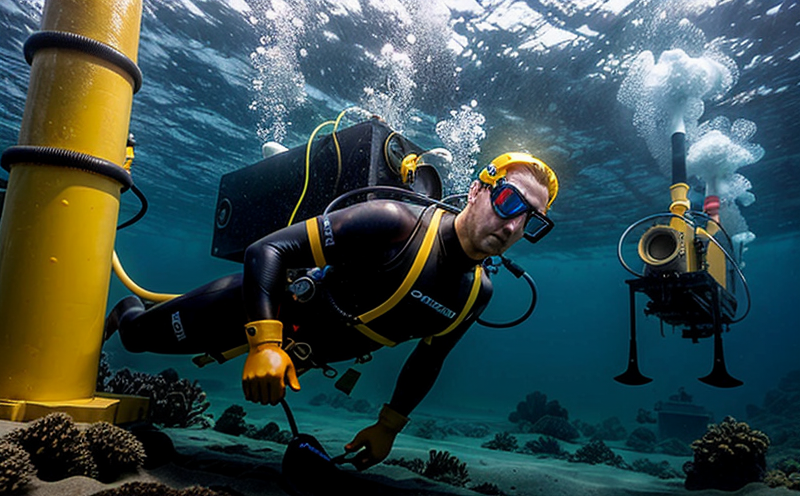API 17J Flexible Pipe Testing for Subsea Systems
The API 17J specification sets the standards for testing flexible pipes used in subsea systems, ensuring they meet stringent requirements that are critical for operational safety and integrity. This standard is pivotal for the oil and gas industry, as it ensures the reliability of flexible pipe components under high-pressure environments found in deep-sea drilling and production operations.
Flexible pipes are integral to subsea systems due to their ability to transmit fluids while being adaptable to various environmental conditions. They must withstand extreme pressures and temperatures, resist corrosion, and maintain flexibility over extended operational lifespans. The API 17J test procedures ensure that these components meet the necessary performance criteria before deployment.
The testing process involves a series of mechanical tests designed to simulate real-world conditions encountered during subsea operations. These tests include hydrostatic pressure testing, burst testing, fatigue testing, and elongation tests. Each test is conducted using specialized equipment calibrated according to international standards (ISO 5193, ISO 4678).
Hydrostatic pressure testing assesses the pipe's ability to withstand high-pressure conditions without failure. This test is critical for ensuring that the pipe can safely operate in deep-sea environments where pressures can exceed several thousand pounds per square inch.
Burst testing evaluates the maximum load that a flexible pipe can endure before it fails. This test provides valuable insights into the ultimate strength of the material used in constructing the pipes. Fatigue tests simulate the cyclic loading conditions expected during operational use, ensuring the pipe's durability over extended periods.
Elongation tests measure the flexibility and elongation properties of the pipe materials under tension. This is crucial for assessing how well the flexible pipe can adapt to varying depths and pressures encountered in subsea operations. These mechanical properties are critical for maintaining the integrity of the system during installation and operation.
Before testing, it's essential to prepare the specimens according to the specified guidelines found within API 17J. This includes ensuring that the pipes are free from defects and contaminants, which could affect test results. Proper specimen preparation is vital to obtaining accurate and reliable test data.
The testing process also involves using advanced instrumentation capable of monitoring critical parameters during each test. Sophisticated sensors measure pressure, temperature, and deformation continuously throughout the tests. This real-time data ensures that the pipes are not subjected to conditions beyond their operational limits, thus safeguarding against potential failures in the field.
After completing all tests, comprehensive reports are generated detailing the results of each mechanical test. These reports serve as critical documentation for quality assurance and compliance with industry standards. They also provide valuable data for continuous improvement efforts within manufacturing processes.
The API 17J specification is widely recognized across various international markets due to its rigorous testing requirements and consistent performance metrics. This standard ensures that flexible pipes used in subsea systems meet the highest safety and quality standards, thereby enhancing operational reliability and reducing risks associated with deep-sea operations.
By adhering to these stringent testing protocols, companies can ensure their products are not only compliant with international regulations but also perform reliably under extreme conditions. This commitment to excellence is essential for maintaining a competitive edge in the global oil and gas industry.
Benefits
The API 17J flexible pipe testing ensures that subsea systems are equipped with reliable components capable of operating safely under extreme conditions. This testing process provides several key benefits:
- Enhanced Reliability: Ensures the integrity and performance of flexible pipes, reducing the risk of operational failures.
- Increased Safety: By adhering to strict testing protocols, potential hazards are identified early, minimizing risks associated with deep-sea operations.
- Regulatory Compliance: Meeting international standards ensures compliance with regulatory requirements, facilitating smoother business operations and market access.
- Improved Durability: Rigorous mechanical tests reveal the true performance capabilities of flexible pipes, leading to longer operational lifespans.
- Enhanced Reputation: Consistent adherence to industry standards enhances a company's reputation for quality and reliability.
- Cost Efficiency: Early identification of defects through thorough testing can prevent costly field failures and repairs.
In summary, API 17J flexible pipe testing is essential for maintaining operational safety, ensuring regulatory compliance, and enhancing the overall performance and longevity of subsea systems.
International Acceptance and Recognition
The API 17J specification enjoys widespread international acceptance and recognition due to its stringent testing requirements and consistent performance metrics. Here are some key points highlighting this:
- American Petroleum Institute (API): As a product of the American Petroleum Institute, API 17J is recognized globally for setting high standards in subsea equipment.
- International Standards Organization (ISO): The testing methodologies align with ISO guidelines, ensuring compatibility and interoperability across different countries.
- European Committee for Standardization (CEN): Compliance with CEN standards ensures that the specification meets European regulatory requirements.
- Institution of Mechanical Engineers (IMechE): IMechE endorsement underscores the credibility and reliability of API 17J in engineering circles.
- International Electrotechnical Commission (IEC): IEC standards are used to ensure that electrical aspects of flexible pipes meet international safety requirements.
The broad recognition of API 17J across various global markets enhances the credibility and marketability of compliant products, making it an essential standard for the oil and gas industry worldwide.





